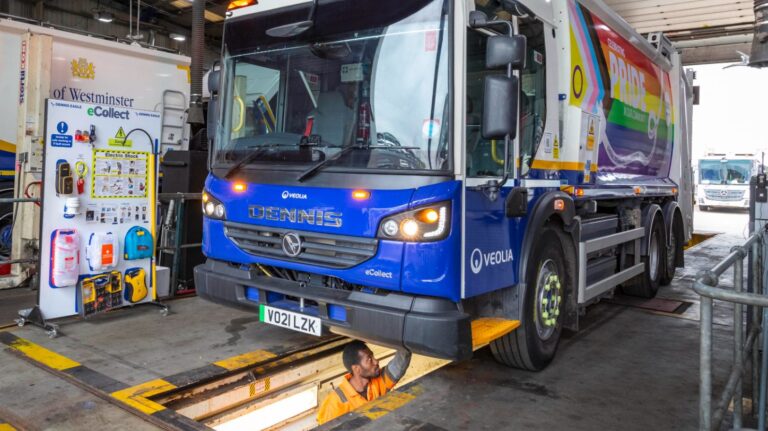In addressing the anticipated shortfall of 16,000 electric vehicle (EV) trained technicians by 2032, Veolia, a resource management company, and training specialists Autotech Training have implemented the first qualification approved by Institute of the Motor Industry (IMI) for the company’s workshop teams.
Transitioning to new technologies and operating practices that cut CO2 and other emissions is a key part of decarbonisation of vehicle fleets, but the growing shortage of qualified vehicle technicians able to work on the latest electric vehicles means training needs to be accelerated to meet operational needs.
Veolia’s existing operations reportedly use more than 200 EVs. It hopes that completion of the training courses will upskill its technicians and enable them to work safely on live high voltage vehicle electrical components.
Almost half of UK fleets failing to plan for net zero future, finds report
The training course incorporates three stages, including IMI Levels 2 and 3 Heavy Vehicle Electric/Hybrid training and lorry manufacturer Dennis Eagle’s training course, which incorporates electric refuse collection vehicles (eRCVs).
Technicians will gain the knowledge and skills required to work on heavy electric and hybrid vehicles and will be fully qualified to carry out operational and repair activities including replacing parts.
Another key aim of the training is to ensure every technician is safeguarded against the dangers of working on or around EVs.
Gary Clark, fleet director in UK and Ireland at Veolia, said: “As we look to achieve a net zero fleet by 2040, we know that maintenance is vital, and to keep our electric vehicle fleet operational we need to have fully staffed workshops that can keep vehicles on the road to make full use of them.”
By providing training to support EV technology, the scheme will address the shortage of qualified EV technicians to help the wider decarbonisation of vehicle fleets in the UK.
Clark concluded: “This first of its type training course will add to our ability to support a rapidly growing number of EVs, enhance safety, and further the decarbonisation of our self-managed fleet.
“It is a great opportunity for our fleet technicians to learn new technology whilst already maintaining a variety of different vehicles, and by training 40 of our technicians we are ensuring we can deliver a zero carbon future fleet.”





